 5 citations,
February 2008 in “Experimental Dermatology”
5 citations,
February 2008 in “Experimental Dermatology” Cyclosporin A promotes hair growth in mice and increases a protein linked to hair growth, but it may not work the same way in humans.
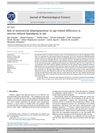 4 citations,
November 2018 in “Journal of pharmacological sciences”
4 citations,
November 2018 in “Journal of pharmacological sciences” Mild exercise reduces pain in older rats through a brain chemical, while intense exercise reduces pain in all rats through a different pain-blocking process.
 4 citations,
March 2018 in “Journal of labelled compounds & radiopharmaceuticals”
4 citations,
March 2018 in “Journal of labelled compounds & radiopharmaceuticals” A new compound was effective for imaging prostate cancer in rats.
 3 citations,
January 2023 in “Physiological Research”
3 citations,
January 2023 in “Physiological Research” Conditioned media from mesenchymal stem cells show promise for tissue repair and disease treatment, but more research is needed on their safety and effectiveness.
 2 citations,
March 2021 in “Carpathian Journal of Food Science and Technology”
2 citations,
March 2021 in “Carpathian Journal of Food Science and Technology” Caraway, Chinese chives, and cassia may improve health and prevent diseases due to their nutrients and medicinal properties.
 1 citations,
November 2023 in “Naunyn-Schmiedeberg's archives of pharmacology”
1 citations,
November 2023 in “Naunyn-Schmiedeberg's archives of pharmacology” Henna has potential health benefits and can treat various conditions, but more research is needed to confirm safety and effectiveness.
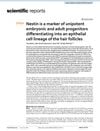 1 citations,
October 2022 in “Scientific reports”
1 citations,
October 2022 in “Scientific reports” Nestin identifies specific progenitor cells in hair follicles that can become outer root sheath cells.
 1 citations,
October 2021 in “Gene, cell and tissue”
1 citations,
October 2021 in “Gene, cell and tissue” Grape sap may help reduce hair loss and promote hair growth in rats.
 1 citations,
January 2021
1 citations,
January 2021 CD4+ skin cells may be precursors to basal cell carcinoma.
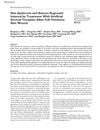 1 citations,
January 2019 in “The International Journal of Lower Extremity Wounds”
1 citations,
January 2019 in “The International Journal of Lower Extremity Wounds” Artificial dermal template treatment can stimulate complete skin and hair follicle regrowth.
 1 citations,
March 2016 in “Neurotoxicity Research”
1 citations,
March 2016 in “Neurotoxicity Research” Finasteride may protect brain and improve behavior in rats with liver failure.
 1 citations,
January 2013 in “Chronicles of young scientists”
1 citations,
January 2013 in “Chronicles of young scientists” Immuno-cosmeceuticals from chicken egg yolk can effectively repair and improve damaged hair.
 1 citations,
July 2005 in “Informa Healthcare eBooks”
1 citations,
July 2005 in “Informa Healthcare eBooks” Hair follicles could be used for targeted drug delivery, with liposomal systems showing promise for this method.
 1 citations,
January 2001 in “Journal of Toxicology-cutaneous and Ocular Toxicology”
1 citations,
January 2001 in “Journal of Toxicology-cutaneous and Ocular Toxicology” Hair follicles could be used to deliver drugs effectively, with the right understanding and methods.
 May 2024 in “Scientific reports”
May 2024 in “Scientific reports” Twist2 is essential for scarless skin healing and hair growth in mouse fetuses.
 April 2024 in “Frontiers in pharmacology”
April 2024 in “Frontiers in pharmacology” Cynoglossum amabile has medicinal potential but poses safety concerns due to liver toxicity.
 April 2024 in “Research Square (Research Square)”
April 2024 in “Research Square (Research Square)” MSC-protein helps regenerate gum tissue and bone.
 March 2024 in “Research Square (Research Square)”
March 2024 in “Research Square (Research Square)” Twist2 is essential for proper skin healing and hair growth in developing mice.
 September 2023 in “Ethiopian journal of health sciences”
September 2023 in “Ethiopian journal of health sciences” Plantain leaf extract reduces liver oxidative stress in malaria-infected mice.
 August 2023 in “Gadua Journal of Pure and Allied Science”
August 2023 in “Gadua Journal of Pure and Allied Science” Ziziphus spina-christi leaf extract lowered blood sugar and protected organs in diabetic rats.
 February 2023 in “Research Square (Research Square)”
February 2023 in “Research Square (Research Square)” Blocking IL-17 can reduce skin inflammation in a mouse model of pityriasis rubra pilaris.
 January 2023 in “International journal of biological sciences”
January 2023 in “International journal of biological sciences” COX2 and ATP synthase control the size of hedgehog spines.
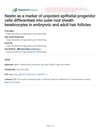 June 2022 in “Research Square (Research Square)”
June 2022 in “Research Square (Research Square)” Nestin-expressing cells turn into a specific type of skin cell in hair follicles during development and in adults.
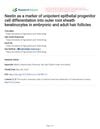 May 2022 in “Research Square (Research Square)”
May 2022 in “Research Square (Research Square)” Nestin marks cells that can become a specific type of skin cell in hair follicles of both developing and adult mice.
 June 2021 in “bioRxiv (Cold Spring Harbor Laboratory)”
June 2021 in “bioRxiv (Cold Spring Harbor Laboratory)” Gene therapy in mice increased lifespan and improved health without causing cancer.
 April 2020 in “bioRxiv (Cold Spring Harbor Laboratory)”
April 2020 in “bioRxiv (Cold Spring Harbor Laboratory)” Skin healing from blisters can delay hair growth as stem cells focus on repairing skin over developing hair.
 April 2019 in “International research journal of pharmacy”
April 2019 in “International research journal of pharmacy” Adiantum capillus extract reduces pain and swelling in animals.
 October 2018 in “InTech eBooks”
October 2018 in “InTech eBooks” The gene Foxn1 is important for hair growth, and understanding it may lead to new alopecia treatments.
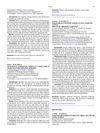 September 2011 in “Clinical Biochemistry”
September 2011 in “Clinical Biochemistry” Glycoconjugates help heal hair follicles during skin repair.
 September 2004 in “Experimental dermatology”
September 2004 in “Experimental dermatology” Melatonin directly affects mouse hair follicles and may influence hair growth.






























